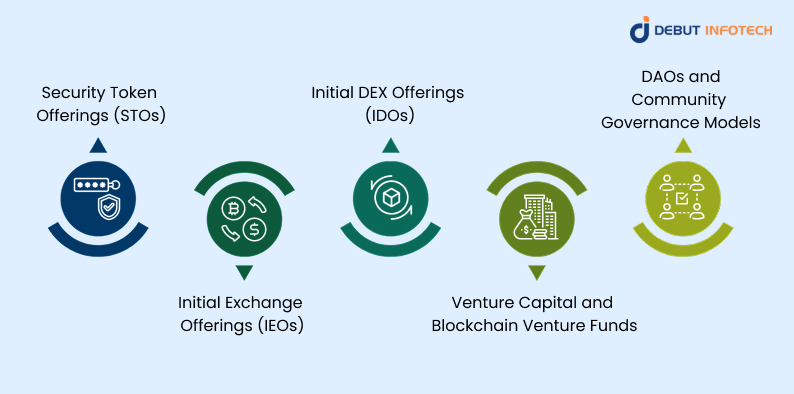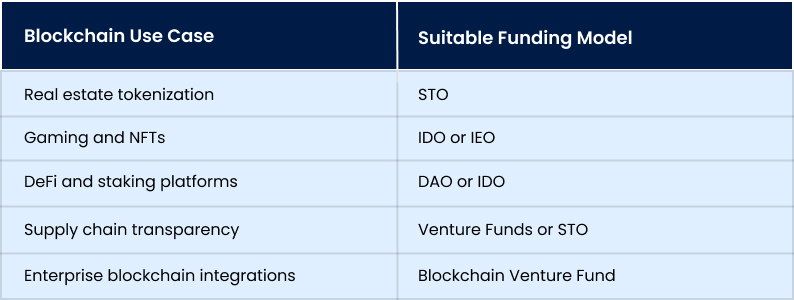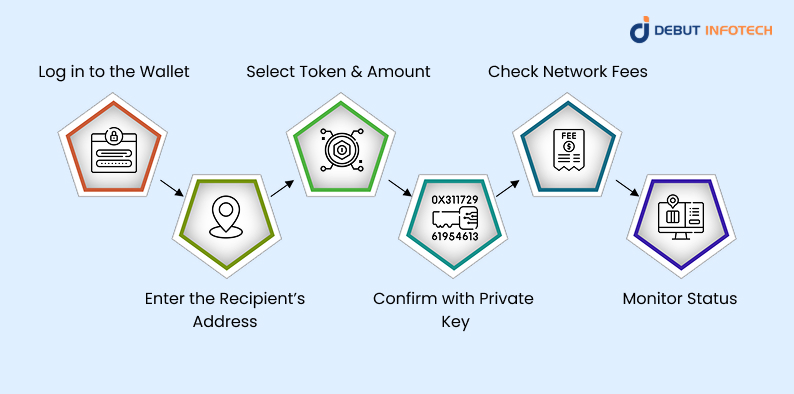Table of Contents
Home / Blog / Blockchain
A Complete Guide to Blockchain Funding Alternatives to ICO
May 21, 2025

May 21, 2025
Securing adequate funding has always been fundamental in blockchain projects alongside developing technically sound products, making the very philosophy of blockchain funding important to grasp. Once, ICOs were the only and dominant method of funding in blockchain projects; however, with the introduction of regulation, the rising caution of investors, and the evolving technologies, new avenues have opened. Now, projects can explore from a pool of ever-growing funding alternatives apart from ICOs, each claiming better transparency, regulation, and investor trust. Knowing these new approaches is fundamental for any entity aspiring to prosper in the blockchain ecosystem.
This guide highlights the most proven, varied, and performing types of blockchain funding beyond traditional ICOs. From Security Token Offerings (STOs) to Initial Dex Offerings (IDOs) and Blockchain Venture Funds, we describe in details about the structure, benefits, use cases, and how to withdraw funds from blockchain. You will also get insights in how blockchain consultants and development partners like Debut Infotech can aid in bringing an ideal funding model that complements your business vision.
Discover Smarter Ways to Raise Capital in Web3
Learn how the right funding model can accelerate your blockchain venture’s success in today’s competitive market.
Why Explore Alternatives to ICO?
ICOs served as a revolutionary funding mechanism during the 2017–2018 boom, enabling startups to raise billions without conventional venture capital. However, they also attracted scams, poor governance, and significant losses for investors. As global regulators began to crack down, the search for more secure, regulated, and sustainable funding models gained momentum.
Alternative funding models, supported by compliant frameworks and evolving types of blockchain platforms, allow businesses to attract capital while maintaining legal clarity and investor confidence. These new approaches also better integrate with real-world assets and enterprise blockchain development initiatives.
Types of Blockchain Funding Models Beyond ICO

As the blockchain industry continues to mature, project founders and entrepreneurs now have access to a growing number of funding alternatives beyond the once-dominant Initial Coin Offering (ICO). Each model brings unique advantages and challenges, depending on a project’s maturity, target market, and regulatory needs. Understanding the diverse options now available helps businesses select the best fit for their goals and industry.
1. Security Token Offerings (STOs)
Security Token Offerings are fully regulated fundraising mechanisms where blockchain-based tokens represent ownership in real-world assets such as equity, bonds, real estate, or revenue-sharing agreements. STOs comply with securities laws, meaning they must follow strict legal frameworks based on the jurisdiction they operate in. This legal backing lends greater legitimacy to the fundraising process, attracting serious investors, including institutions.
- Benefits: Legal compliance, enhanced investor trust, access to regulated capital markets.
- Use Case: Suitable for real estate tokenization, equity distribution, and projects that require investor protection and legal assurances.
2. Initial Exchange Offerings (IEOs)
IEOs are token sales hosted and managed by centralized cryptocurrency exchanges. The exchange vets the project before listing and typically handles KYC, AML, and other regulatory checks. By partnering with a well-known exchange, project teams benefit from an existing user base, built-in trust, and easier token distribution, removing the burden of managing fundraising logistics on their own.
- Benefits: Ready access to an investor community, brand association with trusted exchanges, high liquidity post-sale.
- Use Case: Ideal for early-stage startups or blockchain ventures aiming for quick exposure and streamlined fundraising through a secure platform.
3. Initial DEX Offerings (IDOs)
IDOs represent a decentralized evolution of token sales, where projects launch tokens on decentralized exchanges (DEXs) like Uniswap or PancakeSwap. These offerings are fast, flexible, and permissionless, enabling anyone to participate without gatekeepers. IDOs are often community-driven, with token launches managed by smart contracts, ensuring transparency and automation throughout the process.
- Benefits: Decentralization, low-cost entry, immediate token trading post-launch.
- Use Case: Best suited for DeFi protocols, DAO initiatives, and open-source projects seeking grassroots community support and liquidity.
4. Venture Capital and Blockchain Venture Funds
Venture capital remains a cornerstone of blockchain financing, particularly for startups aiming for scalability. Blockchain venture funds are composed of institutional investors who provide not just capital but mentorship, governance insights, and access to their extensive networks. These investors are usually more selective and look for long-term value propositions.
- Benefits: Long-term funding, strategic backing, credibility in the ecosystem.
- Use Case: Blockchain startups with validated products, revenue potential, or disruptive tech looking to scale into new markets or verticals.
5. DAOs and Community Governance Models
Decentralized Autonomous Organizations (DAOs) represent a revolutionary funding approach where contributors, token holders, or community members collectively fund and govern a project. DAOs pool funds from a distributed user base and allow democratic decision-making via smart contracts. This model reflects the ethos of blockchain: openness, transparency, and community-driven growth.
- Benefits: True decentralization, user participation in decision-making, collective fund management.
- Use Case: Projects that prioritize transparency and want their direction guided by the community, such as protocol governance, NFT collectives, or open-source DeFi apps.
Key Blockchain Use Cases Driving Funding Needs
Each funding model supports a specific segment of blockchain use cases:

From DeFi staking platform development companies to enterprise blockchain development, the variety of blockchain use cases requires adaptable funding models. Companies are now investing in flexible blockchain ecosystem protocols to match these needs.
How to Add Funds to Blockchain Wallets
Understanding how to manage and how to add funds to blockchain wallet is crucial for any blockchain-enabled project.
To add funds to a blockchain wallet, users must:
- Create a Wallet: Choose from custodial or non-custodial wallets depending on security preferences.
- Copy Wallet Address: Every blockchain wallet comes with a public address used for receiving funds.
- Transfer Crypto: Funds can be sent from exchanges or other wallets by entering the wallet address and confirming the transaction.
- Verify Transaction: Confirm on a blockchain explorer or within the wallet app once the network validates the transfer.
Proper wallet setup and integration is a critical part of blockchain business development, especially when managing investor funds or revenue from token sales.
How Long Does Blockchain Hold Funds?
Blockchain does not “hold” funds like traditional banks; instead, it logs transactions on a distributed ledger. Once tokens or cryptocurrencies are transferred to a wallet address, they remain there indefinitely—until moved again by the private key holder. There is no central authority or expiry date on fund holding.
This permanence ensures security but also demands careful private key management. Businesses need to ensure robust key custody protocols, especially when dealing with high-volume transactions in their blockchain platforms.
How to Withdraw Funds From Blockchain Wallets

Withdrawing funds involves moving assets from a blockchain wallet to another wallet or fiat on-ramp (e.g., a crypto exchange).
Steps typically include:
- Log in to the Wallet: Access your account via mobile app, browser extension, or desktop.
- Enter the Recipient’s Address: Add the destination (another wallet or exchange).
- Select Token & Amount: Choose which asset to withdraw and how much.
- Confirm with Private Key: Authorize the transfer using the wallet’s signature method.
- Check Network Fees: Each blockchain has transaction (gas) fees; ensure sufficient balance.
- Monitor Status: Track via transaction ID on a blockchain explorer.
Understanding these withdrawal processes is essential for both developers and end-users managing digital assets.
Role of Blockchain Development Companies
Working with a professional defi staking platform development company like Debut Infotech provides access to tailored services, ranging from blockchain integration to end-to-end token development. Their role is instrumental in:
- Designing compliant token issuance structures.
- Developing smart contracts for funding automation.
- Managing wallet infrastructure and blockchain interoperability.
- Building blockchain platforms optimized for enterprise use.
Additionally, top-tier blockchain consultants can help assess which funding model fits best based on your goals, jurisdiction, and industry.
Cost of Blockchain Development for Funding Projects
Building a blockchain-based funding platform—whether for an STO, IDO, DAO, or hybrid model—involves several layers of cost, each driven by the project’s technical demands, compliance needs, and intended functionality. The development budget is highly influenced by the chosen funding model, with some requiring more rigorous architecture, security, and integrations than others.
- Scope of Work is a key determinant. STOs demand complex smart contracts tied to real-world assets, compliance tracking, and investor verification mechanisms. In contrast, DAO platforms prioritize community governance features and on-chain voting protocols. Each funding type—STO, IEO, IDO, or DAO—requires a distinct blockchain infrastructure and smart contract logic tailored to its goals.
- Security Requirements add another major cost layer. Since funding platforms deal with large volumes of investor capital, robust security is non-negotiable. This includes end-to-end encryption, third-party smart contract audits, and integrations with KYC/AML providers to ensure regulatory adherence. Complying with international legal standards for investor protection also adds to the financial overhead.
- Customization and User Experience needs also affect cost. Projects aiming for a branded, user-friendly experience will need custom UI/UX design, multilingual support, and integration of dashboards, real-time analytics, and blockchain explorers. Incorporating features such as token issuance, vesting schedules, liquidity locks, and payment gateways (fiat and crypto) can significantly expand the development effort.
- On average, the blockchain development cost for a funding-ready platform ranges between $40,000 and $200,000+. Simpler DAO or IDO projects using open-source frameworks and minimal customization may fall on the lower end. In contrast, fully regulated STO platforms or enterprise-grade DAO ecosystems with high customization and advanced compliance can exceed the $200K mark. Partnering with an experienced blockchain development company ensures that your investment goes toward scalable, secure, and regulation-ready infrastructure.
Enterprise Blockchain Integration for Funding Use Cases
Enterprise blockchain integration plays a pivotal role in transforming how organizations approach fundraising, enabling them to design systems that are not only scalable but also compliant with stringent legal and financial standards. These solutions are typically built on robust blockchain platforms and can be customized to align with a company’s infrastructure and stakeholder needs.
One of the most critical benefits is KYC/AML automation, which helps verify investor identities and ensure legal compliance across jurisdictions—crucial for raising capital on a global scale. Additionally, smart contracts for vesting help businesses automate complex token release mechanisms based on milestones or timeframes, reducing the need for manual oversight and eliminating risks of early token dumps.
Multi-signature wallets further reinforce fund security, allowing enterprises to establish joint custody over treasury funds, which mitigates internal fraud risks and supports institutional trust. Paired with audit trails, which record every transaction and action on an immutable ledger, these features enhance financial transparency and governance reporting.
Enterprises also benefit from seamless blockchain integration with internal ERP, CRM, and financial systems. This not only improves workflow efficiency but also ensures that the funding platform becomes an organic extension of the business, rather than a standalone product. For enterprises aiming to raise funds or manage assets through decentralized mechanisms, these features make enterprise-grade blockchain development a necessary investment—not just a technical choice but a strategic one.
Benefits of Exploring Alternative Blockchain Funding Models
Adopting alternative blockchain funding models—such as STOs, IDOs, IEOs, DAOs, or venture-backed initiatives—offers a more structured and strategic path to raising capital. These approaches come with several key advantages over traditional ICOs:
- Regulatory Compliance
Funding models like STOs and IEOs are designed to meet global securities laws, reducing legal risks and enabling access to institutional capital. - Investor Trust
Exchange-led vetting, KYC processes, and transparent governance frameworks build credibility and attract more serious investors. - Flexibility Across Project Types
Whether it’s a DeFi platform, community-driven protocol, or enterprise-level product, options like DAOs and IDOs support a wide range of funding strategies. - Real-Time Transparency
Blockchain’s immutable records and smart contracts provide complete visibility into how funds are allocated and used, increasing accountability.
These benefits are driving more businesses to explore sustainable blockchain business development strategies, aligning funding efforts with long-term growth and trust-driven ecosystems.
An Additional Consideration: Building a Sustainable Token Economy
Beyond raising funds, it’s important to build an economy around your token:
- Utility and Demand: Ensure the token has clear use cases within your ecosystem.
- Incentive Structures: Use DeFi strategies like staking, yield farming, or governance voting.
- Burn Mechanisms: Control inflation through token burns or buybacks.
- Liquidity Planning: Partner with exchanges or DEXs to ensure your token is tradable.
Well-planned token economies increase investor confidence, boost adoption, and strengthen the long-term value of your project.
Fuel Your Blockchain Vision with a Future-Proof Funding Model
Partner with us to design and launch a compliant, scalable blockchain funding platform tailored to your goals.
Conclusion
Blockchain funding has matured beyond the experimental ICO phase. Today, businesses have access to a diverse set of funding models that offer greater transparency, investor protection, and compliance. Whether you choose an STO, IEO, IDO, venture capital, or DAO, the key is aligning your funding model with the specific goals and regulations of your project.
As blockchain technology continues to reshape the way businesses operate and raise capital, working with experienced partners like Debut Infotech becomes essential. From platform development to token engineering and regulatory guidance, they bring the tools and expertise needed to navigate this transformative landscape.
Frequently Asked Questions
Q. What are the main alternatives to ICOs for blockchain funding?
A. The most prominent alternatives include Security Token Offerings (STOs), Initial Exchange Offerings (IEOs), Initial DEX Offerings (IDOs), blockchain venture funds, and Decentralized Autonomous Organizations (DAOs). Each offers different levels of regulatory compliance, investor protection, and technical infrastructure.
Q. How long does blockchain hold funds after a transaction?
A. Blockchain holds funds indefinitely once a transaction is confirmed. Unlike banks, there’s no expiration or automatic reversal—assets remain at the designated wallet address until the owner decides to move them again using their private key.
Q. What’s the process for adding funds to a blockchain wallet?
A. To add funds, first set up a blockchain wallet and copy its public address. Then, transfer cryptocurrency from an exchange or another wallet to that address. Once the transaction is validated by the blockchain network, the funds will appear in your wallet.
Q. What is a blockchain venture fund?
A. A blockchain venture fund is a pool of capital—usually managed by investment firms—dedicated to funding blockchain startups. These funds provide not only financial support but also strategic guidance and access to industry networks.
Q. What are the most secure ways to manage blockchain funds for a project?
A. The most secure methods include using multi-signature wallets to ensure multiple approvals before transactions, integrating hardware wallets for cold storage, and enabling two-factor authentication. For project-level fund management, smart contracts can automate releases based on milestones, and audit logs help maintain transparency and accountability.
Q. What is the cost of developing a blockchain funding platform?
A. Blockchain development cost depends on features, platform type (STO, IDO, DAO), security measures, and third-party integrations. Budgets typically range from $40,000 to over $200,000 based on project scope and customization.
Q. Why should I work with a blockchain development company?
A. A professional blockchain development company like Debut Infotech provides end-to-end services—from token architecture and smart contract development to compliance integration and platform scalability. This ensures your funding model is both technically sound and regulatory-ready.
Talk With Our Expert
Our Latest Insights
USA
Debut Infotech Global Services LLC
2102 Linden LN, Palatine, IL 60067
+1-708-515-4004
info@debutinfotech.com
UK
Debut Infotech Pvt Ltd
7 Pound Close, Yarnton, Oxfordshire, OX51QG
+44-770-304-0079
info@debutinfotech.com
Canada
Debut Infotech Pvt Ltd
326 Parkvale Drive, Kitchener, ON N2R1Y7
+1-708-515-4004
info@debutinfotech.com
INDIA
Debut Infotech Pvt Ltd
Sector 101-A, Plot No: I-42, IT City Rd, JLPL Industrial Area, Mohali, PB 140306
9888402396
info@debutinfotech.com



Leave a Comment